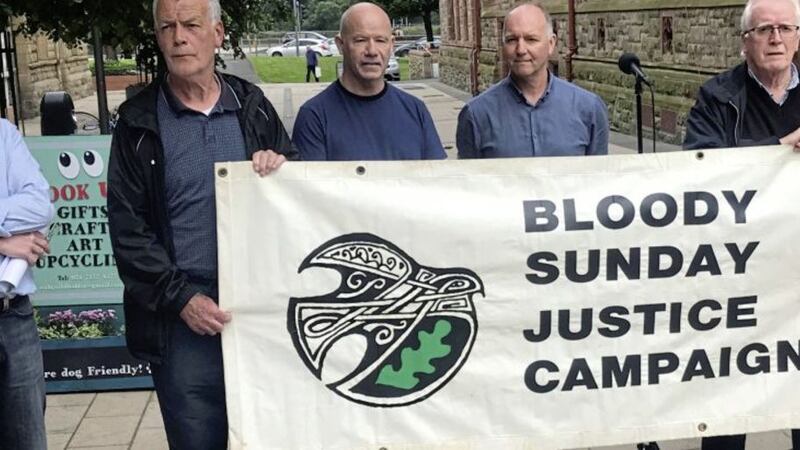There is an optimistic note at the end of Seamus Heaney’s lament for the dead of Bloody Sunday.
Written to the tune of The Boys of Mullaghbawn at the behest of Dubliner Luke Kelly, The Road to Derry recounts Heaney’s journey to the funerals of the men and boys murdered by the Parachute Regiment 50 years ago.
In the short poem he writes of his heart “besieged by anger”. That anger was felt in the hearts of an entire community stunned by the slaughter of innocents that day, and made worse by the cynical cover-up by the soldiers who killed them and the state which sent them there.
And there is anger still that the men who perpetrated this barbaric act are yet to admit their culpability, as anyone who saw Peter Taylor’s interview with the Para’s commander, Colonel Derek Wilford, on Newsnight last week will have seen.
The injustice that day has been amplified over decades by the refusal of Wilford and others to accept the truth; and by the unwillingness of the British state to put the killers on trial.
The Saville inquiry, which exonerated the victims after decades of black propaganda, paints a sickening picture of troops who lost their grip on humanity.
They cannot even be accused of firing indiscriminately. They picked out their targets – boys and young men with everything to live for.
Saville, and British Prime Minister David Cameron’s subsequent admission that “what happened on Bloody Sunday was both unjustified and unjustifiable”, has done little to undo the injustice of that day.
The roll-call is chilling. Jackie Duddy, Michael Kelly, Hugh Gilmour, John Young, Gerald Donaghey and Kevin McElhinney were just 17 years of age.
William Nash was 19. Michael McDaid, 20, was shot going to help him. Jim Wray, 22, was shot in the back, as was Willie McKinney, 26.
Gerry McKinney, 35, was shot with his hands in the air. Paddy Doherty, 31, was trying to crawl to safety; Barney McGuigan, 41, died as he went to help Doherty. He was waving a white handkerchief. John Johnston, 59, later died of his injuries.
No-one has been called to account, and Cameron’s apology after the Saville report was little more than a shallow piece of political theatre. There has been no justice, and 50 years on there appears to be little chance that justice will be done.
Even today, a decade after the British government accepted Saville’s findings – where he identified some of the soldiers directly responsible for the massacre – the establishment has wrapped a protective arm around them.
Bloody Sunday was not an aberration – turning on the locals was the stock-in-trade of British regiments across the globe. As recently as 2020 the International Criminal Court said of the British in Iraq: “It is without dispute there is evidence war crimes were committed.”
Replace Iraq with Kenya, India, Palestine, South Africa, Pakistan, Ireland … and any other country which was part of ‘the empire where the sun never set’, and you have a picture of global Britain as the world really sees it.
The current government’s response to the International Criminal Court judgment – surprise, surprise – has been to introduce legislation to make it more difficult to prosecute soldiers accused of war crimes.
That legislation will also protect the perpetrators of Britain’s dirty war in Ireland.
At this point some readers may be reaching for the ‘whataboutery’. The British weren’t the only perpetrators of atrocities. But they represented ‘the law’.
Nationalism’s response to Bloody Sunday can be seen in the quiet dignity of the bereaved, and their relentless search for justice, despite the lies and misinformation spread by the British government.
And we have witnessed that dignity again in the run-up to this anniversary.
The spirit of Derry can be seen too in the remarkable leadership of Bishop Edward Daly, whose image waving a bloodstained handkerchief stands in stark contrast to the state-sponsored gunmen who desecrated his city.
And it can be seen too in John Hume’s unflinching search for peace, which came to fruition with the Good Friday Agreement.
Now back to Heaney. Instinctively he knew the city would turn its greatest tragedy into a force for good. The last couplet in this verse is profound:
My heart besieged by anger, my mind a gap of danger,
I walked among their old haunts, the home ground where they bled.
And in the dirt lay justice like an acorn in the winter,
Till its oak would sprout in Derry where the thirteen men lay dead.
This weekend the oak stands proud. May they rest in peace.








